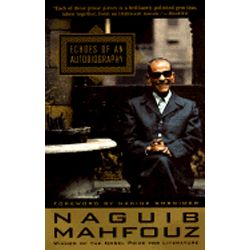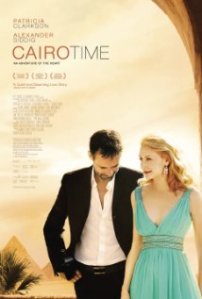 With the recent revolution in Egypt on my mind, I chose my next book: Echoes of an Autobiography by Naguib Mahfouz.
With the recent revolution in Egypt on my mind, I chose my next book: Echoes of an Autobiography by Naguib Mahfouz.
I first read the Egyptian Nobel prize winning writer in my World Lit class as a sophomore in college. His short story “Zaabalawi” (from The Time and The Place and Other Stories) captured me with its colorful, mystical description of a sick man seeking help from an elusive saint, Zaabalawi.
I later read several other books by Mahfouz, including the Cairo Trilogy, which along with “Zaabalawi,” remains my favorite. The depiction of Egyptian life for the members of one particular family, their acquaintances, friends and community members, is fascinating in a real, richly drawn way.
Before moving to California, I was thinking of going abroad again to teach English and Cairo was first on my list. Truth be told, I’m a little sad I missed all the action! Though the uncertainty during those 18 days may have been scarier than the desired outcome allows me to imagine.
Ironically, Echoes opens with “A Prayer”: “I was less than seven years old when I said a prayer for the revolution.”
This would’ve been the revolution to liberate Egypt from British control in 1919. Still, it’s timely.
Echoes is an unusual autobiography by a creative writer of fiction, well described in Nadine Gordimer’s intro:
“The aphorisms, parables, allegories in this work of Naguib Mahfouz have no dates appended. It’s of no account when he wrote them. The back-and-forth of a mind creating its consciousness expands and contracts, rather than roves between past and present, with a totality which is not merely memory. . . . The totality is the comprehension of past and present experience as elements which exist contemporaneously. These pieces are meditations which echo that which was, has been, and is the writer, Mahfouz.”
The idea that our lives, if we all were to write them, are “not merely memory” is fascinating to me. We feel what’s significant to us, but often we can’t remember if it’s because of something that happened to us or someone we know; if we heard it in a story or a parable, from a grandmother or a friend, or a new acquaintance at a party. Why do we believe what we do? Where does the truth we know come from? In many cases, we don’t know, but what makes it ours is that we accept and incorporate the experience, whether our own or someone else’s, into our lives. Like an echo. We hear it, but by the time it reaches us, how long has it traveled from the original sound?
It’s kind of a kick-ass way to approach an autobiography. But I could see that it might be frustrating if you were prepared to read about his life from birth to fairly recent death at age 95. My advice? Read the intro first. I usually skip them, but I’m glad I didn’t this time.
Echoes of grief, joy, secrets, dreams, observances of Islamic holidays, a conversation in a pool hall, the book is like an impressionistic montage of his experience. Sometimes it seems like Mahfouz chose to include some of these stories (the more straightforward realistic ones) because they aptly illustrate his feelings about a difficult, abstract idea. Other anecdotes seem concocted to raise a particular question he (presumably!) likes to grapple with. In this way, Echoes IS a journey through life, but not the year-by-year, milestone-by-milestone type of thing that most biographies tend to be.
Really, though, what you want to know about a writer whose work you admire is what questions does (s)he have? What does (s)he spend time thinking about? That is what you get in Mahfouz’s echoes. Brief glimpses, insights into what life is like—if not specifically his life’s resume, then life, the grand concept, through his eyes.
Mahfouz wrote screenplays and worked in a couple of governmental film regulating offices. I’ve not seen any of the films he worked on, but an excellent peek into modern Cairo is last year’s Cairo Time, written and directed by Ruba Nadda. It’s a gorgeous, quietly gripping love story starring Patricia Clarkson and Alexander Siddig.
I was fortunate enough to see the filmmaker present it at SIFF last year. Nadda, now in Toronto, grew up in the Middle East and talked about taking a family vacation to Cairo, which she characterized as “the Hollywood of the Arab world”. She said she fell in love with it then, and you can see her feeling and tenderness in the film.
There is undeniably something magical about Cairo. Here’s hoping that the Egyptian people and their rich culture prosper under new leadership.


I wanna read Echoes!